06 复合不定代词和频度副词-2023年(七升八)新八年级暑假衔接自学课(人教版)(带参考答案及详解)
文档属性
| 名称 | 06 复合不定代词和频度副词-2023年(七升八)新八年级暑假衔接自学课(人教版)(带参考答案及详解) | 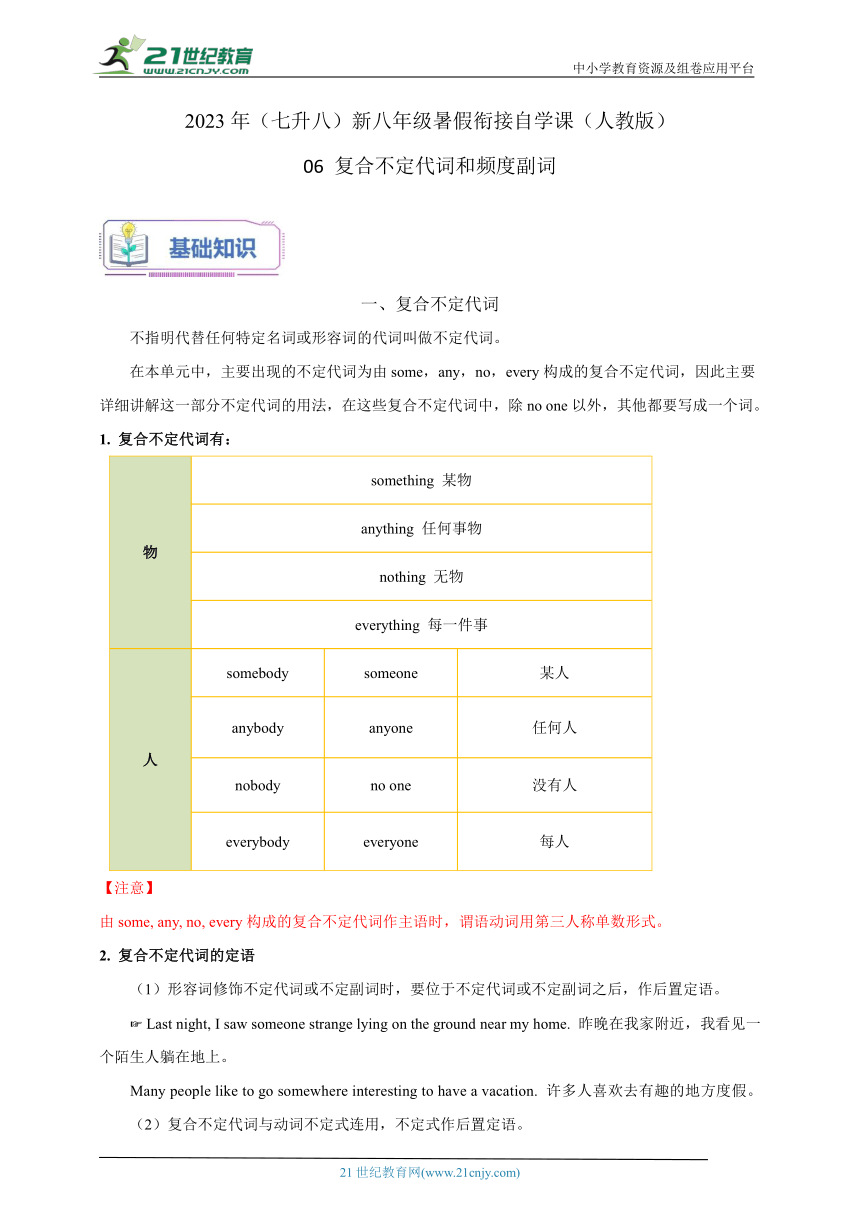 | |
| 格式 | doc | ||
| 文件大小 | 362.8KB | ||
| 资源类型 | 试卷 | ||
| 版本资源 | 人教新目标(Go for it)版 | ||
| 科目 | 英语 | ||
| 更新时间 | 2023-07-03 20:37:54 | ||
图片预览

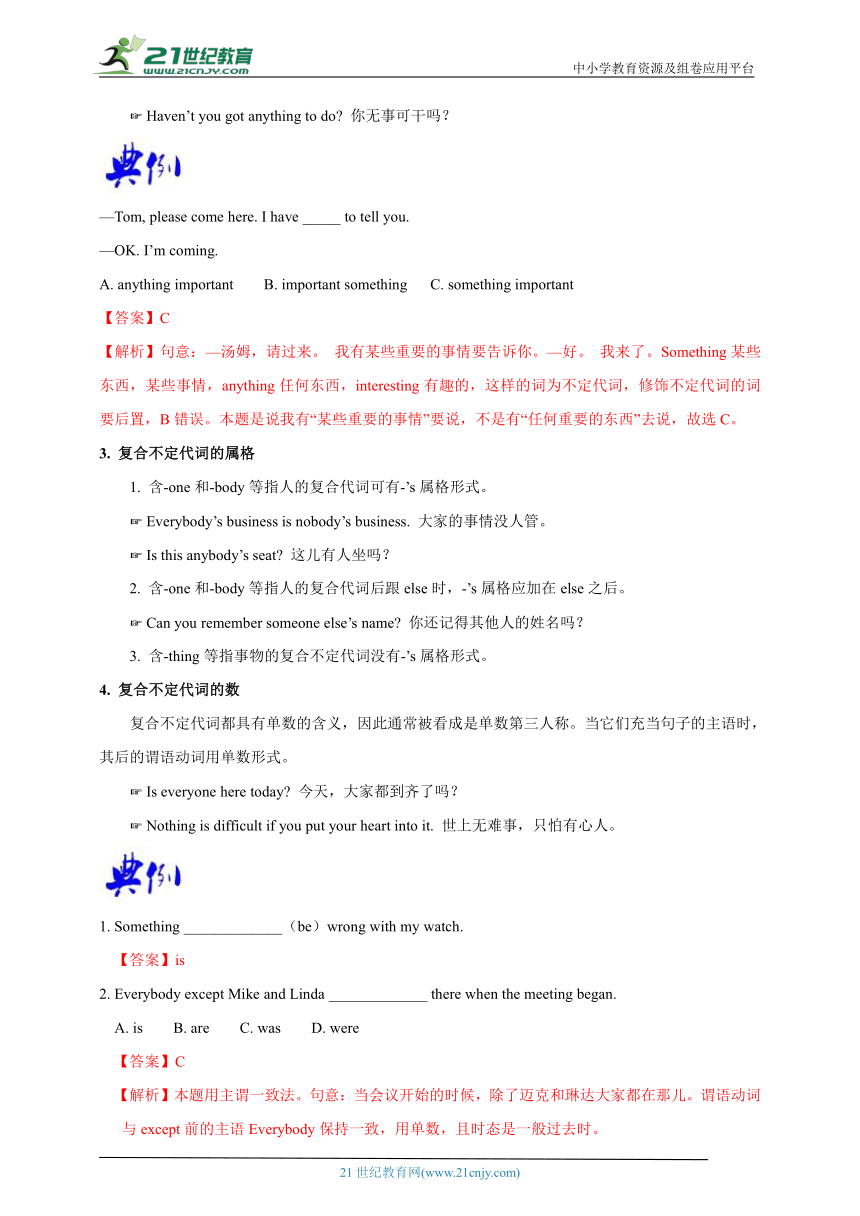
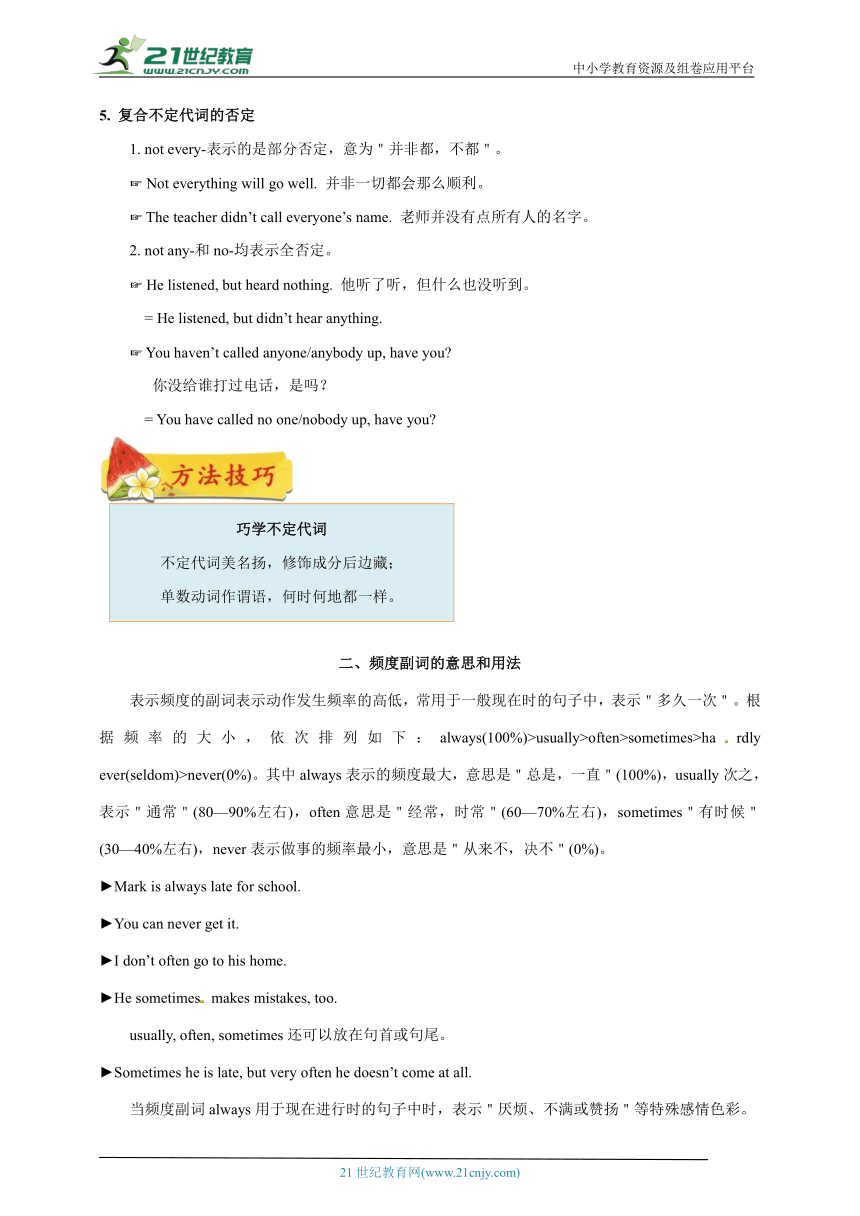
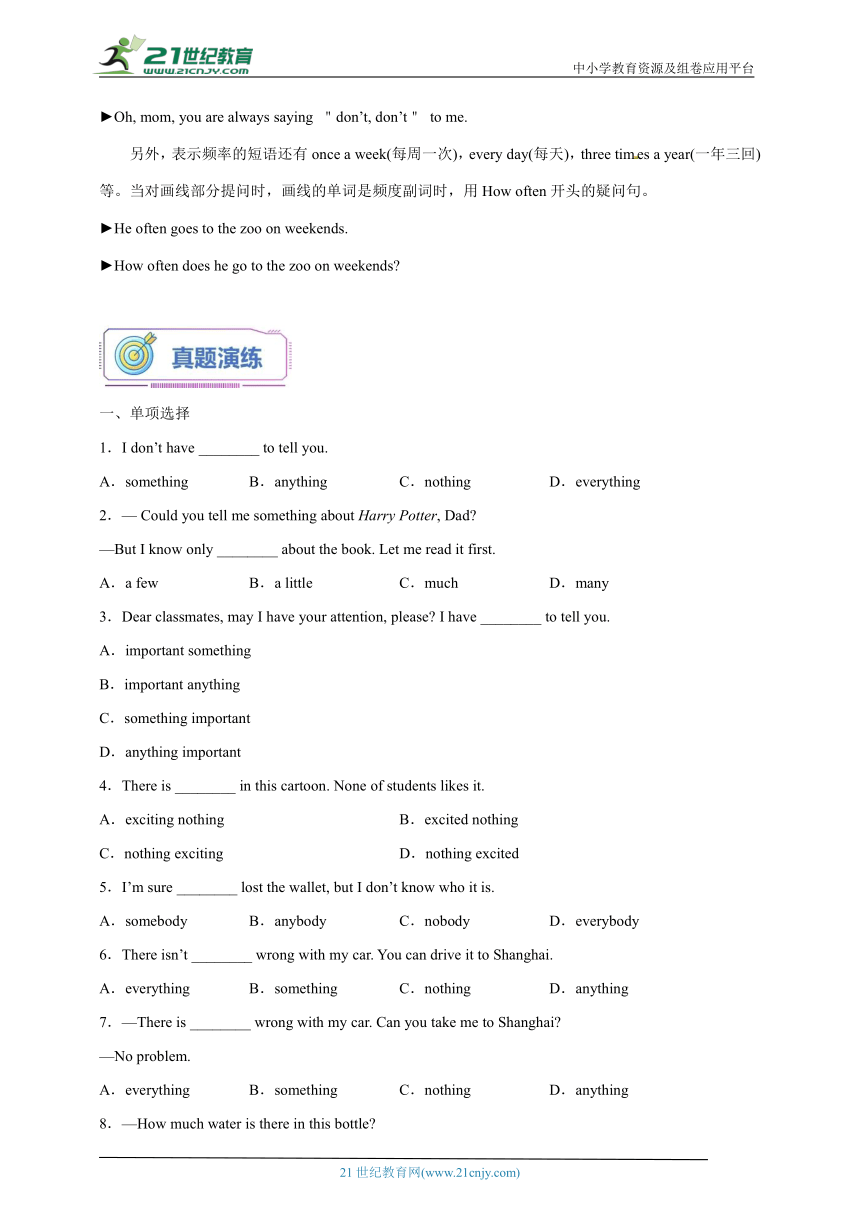
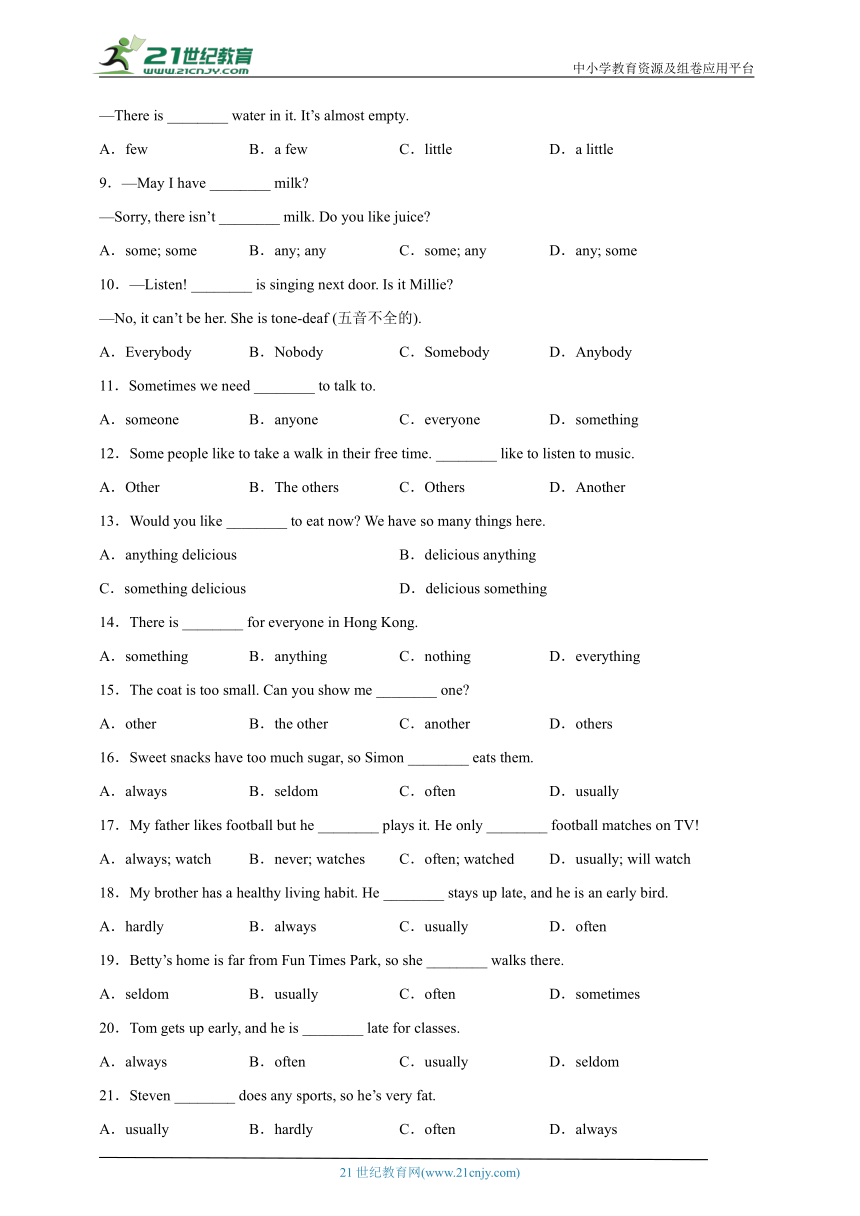
文档简介
中小学教育资源及组卷应用平台
2023年(七升八)新八年级暑假衔接自学课(人教版)
06 复合不定代词和频度副词
一、复合不定代词
不指明代替任何特定名词或形容词的代词叫做不定代词。
在本单元中,主要出现的不定代词为由some,any,no,every构成的复合不定代词,因此主要详细讲解这一部分不定代词的用法,在这些复合不定代词中,除no one以外,其他都要写成一个词。
1. 复合不定代词有:
物 something 某物
anything 任何事物
nothing 无物
everything 每一件事
人 somebody someone 某人
anybody anyone 任何人
nobody no one 没有人
everybody everyone 每人
【注意】
由some, any, no, every构成的复合不定代词作主语时,谓语动词用第三人称单数形式。
2. 复合不定代词的定语
(1)形容词修饰不定代词或不定副词时,要位于不定代词或不定副词之后,作后置定语。
Last night, I saw someone strange lying on the ground near my home. 昨晚在我家附近,我看见一个陌生人躺在地上。
Many people like to go somewhere interesting to have a vacation. 许多人喜欢去有趣的地方度假。
(2)复合不定代词与动词不定式连用,不定式作后置定语。
Haven’t you got anything to do 你无事可干吗?
—Tom, please come here. I have _____ to tell you.
—OK. I’m coming.
A. anything important B. important something C. something important
【答案】C
【解析】句意:—汤姆,请过来。 我有某些重要的事情要告诉你。—好。 我来了。Something某些东西,某些事情,anything任何东西,interesting有趣的,这样的词为不定代词,修饰不定代词的词要后置,B错误。本题是说我有“某些重要的事情”要说,不是有“任何重要的东西”去说,故选C。
3. 复合不定代词的属格
1. 含-one和-body等指人的复合代词可有-’s属格形式。
Everybody’s business is nobody’s business. 大家的事情没人管。
Is this anybody’s seat 这儿有人坐吗?
2. 含-one和-body等指人的复合代词后跟else时,-’s属格应加在else之后。
Can you remember someone else’s name 你还记得其他人的姓名吗?
3. 含-thing等指事物的复合不定代词没有-’s属格形式。
4. 复合不定代词的数
复合不定代词都具有单数的含义,因此通常被看成是单数第三人称。当它们充当句子的主语时,其后的谓语动词用单数形式。
Is everyone here today 今天,大家都到齐了吗?
Nothing is difficult if you put your heart into it. 世上无难事,只怕有心人。
1. Something _____________(be)wrong with my watch.
【答案】is
2. Everybody except Mike and Linda _____________ there when the meeting began.
A. is B. are C. was D. were
【答案】C
【解析】本题用主谓一致法。句意:当会议开始的时候,除了迈克和琳达大家都在那儿。谓语动词与except前的主语Everybody保持一致,用单数,且时态是一般过去时。
5. 复合不定代词的否定
1. not every-表示的是部分否定,意为"并非都,不都"。
Not everything will go well. 并非一切都会那么顺利。
The teacher didn’t call everyone’s name. 老师并没有点所有人的名字。
2. not any-和no-均表示全否定。
He listened, but heard nothing. 他听了听,但什么也没听到。
= He listened, but didn’t hear anything.
You haven’t called anyone/anybody up, have you
你没给谁打过电话,是吗?
= You have called no one/nobody up, have you
巧学不定代词不定代词美名扬,修饰成分后边藏;单数动词作谓语,何时何地都一样。
二、频度副词的意思和用法
表示频度的副词表示动作发生频率的高低,常用于一般现在时的句子中,表示"多久一次"。根据频率的大小,依次排列如下:always(100%)>usually>often>sometimes>hardly ever(seldom)>never(0%)。其中always表示的频度最大,意思是"总是,一直"(100%),usually次之,表示"通常"(80—90%左右),often意思是"经常,时常"(60—70%左右),sometimes"有时候"(30—40%左右),never表示做事的频率最小,意思是"从来不,决不"(0%)。
Mark is always late for school.
You can never get it.
I don’t often go to his home.
He sometimes makes mistakes, too.
usually, often, sometimes还可以放在句首或句尾。
Sometimes he is late, but very often he doesn’t come at all.
当频度副词always用于现在进行时的句子中时,表示"厌烦、不满或赞扬"等特殊感彩。
Oh, mom, you are always saying "don’t, don’t" to me.
另外,表示频率的短语还有once a week(每周一次),every day(每天),three times a year(一年三回)等。当对画线部分提问时,画线的单词是频度副词时,用How often开头的疑问句。
He often goes to the zoo on weekends.
How often does he go to the zoo on weekends
一、单项选择
1.I don’t have ________ to tell you.
A.something B.anything C.nothing D.everything
2.— Could you tell me something about Harry Potter, Dad
—But I know only ________ about the book. Let me read it first.
A.a few B.a little C.much D.many
3.Dear classmates, may I have your attention, please I have ________ to tell you.
A.important something
B.important anything
C.something important
D.anything important
4.There is ________ in this cartoon. None of students likes it.
A.exciting nothing B.excited nothing
C.nothing exciting D.nothing excited
5.I’m sure ________ lost the wallet, but I don’t know who it is.
A.somebody B.anybody C.nobody D.everybody
6.There isn’t ________ wrong with my car. You can drive it to Shanghai.
A.everything B.something C.nothing D.anything
7.—There is ________ wrong with my car. Can you take me to Shanghai
—No problem.
A.everything B.something C.nothing D.anything
8.—How much water is there in this bottle
—There is ________ water in it. It’s almost empty.
A.few B.a few C.little D.a little
9.—May I have ________ milk
—Sorry, there isn’t ________ milk. Do you like juice
A.some; some B.any; any C.some; any D.any; some
10.—Listen! ________ is singing next door. Is it Millie
—No, it can’t be her. She is tone-deaf (五音不全的).
A.Everybody B.Nobody C.Somebody D.Anybody
11.Sometimes we need ________ to talk to.
A.someone B.anyone C.everyone D.something
12.Some people like to take a walk in their free time. ________ like to listen to music.
A.Other B.The others C.Others D.Another
13.Would you like ________ to eat now We have so many things here.
A.anything delicious B.delicious anything
C.something delicious D.delicious something
14.There is ________ for everyone in Hong Kong.
A.something B.anything C.nothing D.everything
15.The coat is too small. Can you show me ________ one
A.other B.the other C.another D.others
16.Sweet snacks have too much sugar, so Simon ________ eats them.
A.always B.seldom C.often D.usually
17.My father likes football but he ________ plays it. He only ________ football matches on TV!
A.always; watch B.never; watches C.often; watched D.usually; will watch
18.My brother has a healthy living habit. He ________ stays up late, and he is an early bird.
A.hardly B.always C.usually D.often
19.Betty’s home is far from Fun Times Park, so she ________ walks there.
A.seldom B.usually C.often D.sometimes
20.Tom gets up early, and he is ________ late for classes.
A.always B.often C.usually D.seldom
21.Steven ________ does any sports, so he’s very fat.
A.usually B.hardly C.often D.always
22.Alice checked her test paper ______ in order to get a full mark.
A.enough careful B.enough carefully C.careful enough D.carefully enough
23.—I ________ watch sports news because it’s boring.
—Really But I think it’s interesting.
A.always B.hardly ever C.usually D.sometimes
24.Mr. Smith doesn’t like swimming, so he ______ goes swimming with his children.
A.always B.usually C.often D.seldom
25.The rain is very ________, and it’s raining ________.
A.heavy; heavily B.hard; hardly C.hardly; heavily D.heavy; heavy
26.________ he goes to work on foot.
A.Some times B.Some time
C.Sometime D.Sometimes
27.The old man lives ________, but he doesn’t feel ________.
A.alone; lone B.lonely; lonely
C.alone; lonely D.lonely; alone
28.It is hot every summer in Xinjiang and it ________ rains.
A.sometimes B.always C.never D.seldom
29.I must have a good sleep, so I ________ sleep late.
A.sometimes B.often C.seldom D.never
30.—Joan makes great progress (进步) in speaking Chinese.
—She ________ works hard at it, you know.
A.never B.hardly C.always D.sometimes
二、阅读选择
A
School starts tomorrow. My good friend Li Peng and I want to buy some school things. We go to the shop near my home. There are many students in the shop. Li Peng buys a green pen and two pencils, a black one and a red one. He buys a pencil box, too. My sister has a lot of pens and pencils, so I only buy some notebooks (笔记本).
“Look! There is a nice watch on the floor. Is that your watch, Lin Tao ” Li Peng asks me.
“No,” I say.
Then he picks up (捡起) the watch and asks the girl near us, “Excuse me, is this your watch ”
“No, my watch is at home,” the girl answers.
Just then, a boy comes to us and says, “It’s my watch. My mother buys it for me as a birthday present.
“But how do we know it belongs to you ” asks Li Peng.
“There are two words on the back of the watch. They’re Ma Jun, My name is Ma Jun,” the boy says.
When we look at the back, we see the two words. So we give the watch to the boy.
31.Where is the shop
A.Near Lin Tao’s home. B.Near the school.
C.Near Li Peng’s home. D.Near a park.
32.Why doesn’t Lin Tao buy any pens and pencils
A.Because they are not good. B.Because he doesn’t like the colors.
C.Because his sister will give some to him. D.Because he doesn’t have enough money.
33.Whose watch is it
A.The girl’s. B.Ma Jun’s. C.Lin Tao’s. D.Li Peng’s.
34.From the passage, we can know________.
A.six students are in the shop B.there is a name on the back of the watch
C.Li Peng, Lin Tao and Ma Jun are good friends D.Lin Tao doesn’t buy anything in the shop
35.What is the passage mainly about
A.The lost watch in the shop. B.What to buy.
C.Some English books. D.School things.
B
Children Club
The Children Club is an after-school club for children of 4—13. You can learn music, sports, drawing and dancing in this club. All children can have a good time here. Join us! Time: April 20th-July 4th, Monday-Friday, 8a. m.—6p. m. Price: $25 a day·Please bring your lunch. ·You needn’t take any fruit. Fruit is free here. ·Your parents don’t have to drive you here. We have our school bus. Address: Children Club Head OfficeE-mail address: info@Telephone number: 6987746/3235376
36.Who can join the Children Club
A.Three-year-old Jack. B.Ten-year-old Tom.
C.Fourteen-year-old John. D.Twenty-year-old Amy.
37.What can children learn at Children Club
①sports ②chess ③drawing ④dancing
A.①②③ B.①③④ C.①②④ D.②③④
38.If Peter joins the Children Club for ten days, he needs to pay(支付) ________.
A.$150 B.$200 C.$250 D.$350
39.What is free in the Children Club
A.Drinks. B.Breakfast. C.Lunch. D.Fruit.
40.The advertisement(广告)is for ________.
A.Children B.Parents C.Teachers D.Library workers
三、语法选择
请通读下面短文,掌握其大意,根据语法和上下文连贯的要求,从每小题三个选项中选出一个最佳的答案,并将答题卡对应题目所选的选项涂黑。
There are forty students in our class. Our English teacher 41 Miss Li. She teaches us very well. Miss Li asks us 42 sports after class. She says it’s good for our 43 . There are also two American boys. 44 are Jack and Mike. They are our good 45 . They like watching TV, 46 they don’t like playing basketball.
They often go to school 47 bike. And I often go to school on foot. There is one English girl in our class. Her name is Lucy, She likes playing 48 basketball and she also likes swimming. She usually does her homework in the evening. She often 49 TV on Saturday afternoon. She likes Chinese food. She often comes to my home. And my mother 50 cooks delicious food for her.
41.A.are B.am C.is
42.A.does B.doing C.to do
43.A.healthy B.health C.healthily
44.A.Their B.Them C.They
45.A.friend B.friends C.friend’s
46.A.but B.and C.so
47.A.on B.by C.in
48.A.a B.an C./
49.A.watching B.watched C.watches
50.A.never B.always C.hardly
四、短文选择
There are two mice(老鼠). They are good friends. One lives in the village, the 51 lives in the city.
One day, the city mouse comes to see the village mouse. 52 leaving, the city mouse says, “This food is not good, and your house is not good, 53 . You should come and live in the city. You will live in a nice house. You will have nice food to e and see me at my house in the city.”
Then the village mouse goes to the home of the city mouse. It is 55 very good house. There is nice food on the table for 56 . But just as they start to eat, they hear a great meow(猫叫声). The city mouse says, “Run! Run! The 57 is coming now!”
They run away quickly and hide(隐藏) in a box. When they come 58 of the box, the village mouse says, “I don’t like living in the city. I don’t want to 59 afraid. I like living in the village. It is nice to be poor(贫穷的) 60 happy.”
参考答案:
1.B
【详解】句意:我没有任何事情要告诉你。
考查不定代词。something一些事情;anything任何事情;nothing没有事情;everything一切事情。句子为否定句,anything可用于否定句。故选B。
2.B
【详解】句意:——爸爸,你能告诉我一些关于《哈利·波特》的事吗?——可我只知道一点点,让我先读一下。
考查代词。a few一些(修饰可数名词);a little一些(修饰不可数名词);much许多(修饰不可数名词);many许多(修饰可数名词)。根据“Let me read it first.”可知,爸爸不太了解这本书,a little符合语境。故选B。
3.C
【详解】句意:亲爱的同学们,请注意,我有重要的事情要告诉你们。
考查不定代词的用法。important重要的;something某事;anything任何事情。本题是肯定句,不能用anything,故排除B和D;形容词修饰不定代词时,形容词要后置,故排除A。故选C。
4.C
【详解】句意:这个动画片没有什么令人兴奋的地方。没有一个学生喜欢它。
考查形容词辨析和定语后置。exciting令人兴奋的,形容某物;excited兴奋的,形容人的感受;nothing没有什么。根据“cartoon”可知,应用exciting,排除BD选项;再根据形容词修饰复合不定代词要置于其后,排除A选项。故选C。
5.A
【详解】句意:我确定有人丢了钱包,但是我不知道是谁。
考查代词辨析。somebody某人;anybody任何人;nobody没有人;everybody每个人。根据“lost the wallet”可知有人丢了钱包,用somebody。故选A。
6.D
【详解】句意:我的车没有故障。你可以把它开到上海。
考查代词辨析。everything所有事物;something某事,某物,主要用于肯定句中;nothing没有什么;anything某事,某物,主要用于否定句,疑问句,用以代替something。根据“There isn’t...wrong with my car.”可知,此句为否定句,应用anything,表示没有故障。故选D。
7.B
【详解】句意:——我的车出毛病了。你能带我去上海吗?——没问题。
考查不定代词辨析。everything一切;something某事,某物;nothing没有什么;anything任何事情。根据“Can you take me to Shanghai”可知,车出了问题,此处是there is something wrong with sth.“某物出毛病了”。故选B。
8.C
【详解】句意:——这个瓶子里有多少水?——里面几乎没有水。几乎是空的。
考查不定代词辨析。few几乎没有,修饰可数名词复数,表否定含义;a few一些,修饰可数名词复数,表肯定含义;little几乎没有,修饰不可数名词,表否定含义;a little一点,修饰不可数名词,表肯定含义。water是不可数名词,应用little或a little修饰,排除选项A、B;根据“It’s almost empty.”可知,几乎没水了。故选C。
9.C
【详解】句意:——我能喝些牛奶吗?——抱歉,没有牛奶。你喜欢果汁吗?
考查不定代词。some一些,用在疑问句中表示希望得到对方肯定回答;any一些,用于否定句或疑问句中。根据“May I have...milk ”和“Sorry, there isn’t...milk.”可知,第一处表示希望得到对方肯定回答,要用some;第二处是否定句,要用any,故选C。
10.C
【详解】句意:——听!有人在隔壁唱歌。是Millie吗?——不,不可能是她。她五音不全。
考查不定代词。Everybody所有人;Nobody没有人;Somebody某人;Anybody任何人。根据“Listen!”和“No, it can’t be her.”可知,有人在唱歌,故选C。
11.A
【详解】句意:有时候我们需要有个人可以聊聊天。
考查代词辨析。someone某人;anyone任何人;everyone每个人;something某些东西。根据“ to talk to”可知,需要某个人聊聊天,因此“someone”符合句意,故选A。
12.C
【详解】句意:一些人喜欢在空闲时间散步,另一些人喜欢听音乐。
考查代词辨析。Other其他的;The others特指剩余的所有人或物;Others泛指剩余的一部分;Another另一个。此处和“Some people”对应的应该是others,some ... others“一些……另一些……”。故选C。
13.C
【详解】句意:你想吃点好吃的吗?我们这里有这么多东西。
考查复合不定代词以及形容词的位置。something常用于肯定句或表建议、请求的疑问句中;anything常用于否定句或疑问句中。“Would you like…”是表建议的疑问句,故用不定代词something;形容词修饰复合不定代词时应后置,即something delicious。故选C。
14.A
【详解】句意:在香港有每个人想要的一些东西。
考查代词辨析。something某物,某事;anything任何事物/事情;nothing没有什么;everything每件事,一切。根据“There is”和“for everyone”可知句子为肯定句,表示“有每个人想要的东西”,应用不定代词something来表示“某些东西”。故选A。
15.C
【详解】句意:这件外套太小了。你能再给我看一个吗?
考查代词辨析。other其他的;the other两者中的另一个;another三者或三者以上的另一个;others其他人或物。根据“The coat is too small. Can you show me...one”可知是再看一个,是多者中的另一个,用another。故选C。
16.B
【详解】句意:甜点有太多的糖,因此Simon很少吃它们。
考查副词。always总是;seldom很少;often经常;usually通常。根据前文“Sweet snacks have too much sugar” 可知,因为有太多的糖,所以应是很少吃。故选B。
17.B
【详解】句意:我父亲喜欢足球,但他从来不踢。他只在电视上看足球比赛。
考查频度副词和时态。根据“My father likes football but he...plays it.”可知,but表示转折,虽然爸爸喜欢足球,但他从来不踢,因此此空用never表示否定;根据语境可知,题干时态为一般现在时,主语He为第三人称单数,动词应用第三人称单数形式。故选B。
18.A
【详解】句意:我的弟弟有健康的生活习惯。他几乎不熬夜且习惯早起。
考查副词辨析。hardly几乎不;always总是;usually通常;often经常。根据“My brother has a healthy living habit.”可知熬夜不是健康生活习惯,此处用表否定意义的副词hardly,此处表示几乎不熬夜。故选A。
19.A
【详解】句意:贝蒂的家离欢乐时代公园很远,所以她几乎不步行去那。
考查副词辨析。seldom很少,不常;usually通常;often经常;sometimes有时。根据“Betty’s home is far from Fun Times Park”可知,她家离欢乐时光公园很远,所以几乎不走路去那,故选A。
20.D
【详解】句意:汤姆起床很早,他上课很少迟到。
考查副词辨析。always总是;often经常;usually通常;seldom很少。根据“Tom gets up early”可知,汤姆起床很早,所以很少迟到。故选D。
21.B
【详解】句意:史蒂芬几乎不做任何运动,所以他非常胖。
考查频度副词的用法。usually通常;hardly几乎不;often经常;always总是。根据“he’s very fat.”可知,他非常胖,可以知道史蒂芬几乎不做运动。应该选择hardly表示否定意义。故选B。
22.D
【详解】句意:为了得满分,爱丽丝足够仔细地检查她的试卷。
考查词义辨析以及enough的位置。careful仔细的;carefully仔细地。此空修饰动词checked,应用副词carefully。enough修饰副词要放在其后,故选D。
23.B
【详解】句意:——我几乎从不看体育新闻,因为它很无聊。——真的吗?但我觉得它很有趣。
考查副词辨析。always总是;hardly ever几乎从不;usually通常;sometimes有时。根据“because it’s boring.”可知,此处指的是“几乎不看体育新闻”,故选B。
24.D
【详解】句意:史密斯先生不喜欢游泳,所以他很少和孩子们一起去游泳。
考查频度副词的辨析。always总是;usually通常;often经常;seldom很少。根据题干中的“Mr. Smith doesn’t like swimming”可知,史密斯先生不喜欢游泳,所以他很少去游。故选D。
25.A
【详解】句意:雨很大,而且下得很大。
考查形容词副词辨析。heavy大量的,形容词;heavily大量地,副词;hard困难的,形容词;hardly几乎不,副词。根据“The rain is very ...”可知,第一空指雨很大,应用形容词heavy作表语;再根据“it’s raining ...”可知,第二空指雨下得很大,应用副词heavily修饰谓语动词。故选A。
26.D
【详解】句意:有时候我走路去上班。
考查副词用法。some times几次;some time一些时间;sometime将来或过去的某个时间;sometimes有时。根据“he goes to work on foot.”可知此处用sometimes表示频率。故选D。
27.C
【详解】句意:这位老人独自居住,但是他不感到孤单。
考查词义辨析。alone独自,副词;单独的,形容词,强调无人陪伴;lonely孤单的,形容词,带有强烈的感彩。第一个空格是修饰动词lives,表示“独自居住”,用副词alone;第二个空格前feel是感官动词,后接形容词作表语,表示主观上“感到孤独”,应用lonely;故选C。
28.D
【详解】句意:新疆每年夏天都很热,很少下雨。
考查副词辨析。sometimes有时;always总是;never从不;seldom很少。根据“It is hot every summer in Xinjiang and it...rains”可知应该是很少下雨,而不是从不下雨。故选D。
29.D
【详解】句意:我必须睡个好觉,所以我从不晚睡。
考查副词辨析。sometimes有时;often经常;seldom很少;never从不。前后是因果关系,因为我必须睡好觉,所以从不晚睡。故选D。
30.C
【详解】句意:——琼在说中文方面进步很大。——你知道,她总是努力学习。
考查频度副词。never从不;hardly几乎不;always总是;sometimes有时。根据“Joan makes great progress (进步) in speaking Chinese.”可知,琼进步很大,所以应该是她总是努力学习。故选C。
31.A 32.C 33.B 34.B 35.A
【导语】本文是一篇记叙文。本文主要描述了林涛和李鹏在商店里发现一只手表并寻找失主的故事。
31.细节理解题。根据“We go tothe shop near my home”可知,商店在林涛家旁边。故选A。
32.细节理解题。根据“My sister has a lot of pens and pencils, so I only buy some notebooks (笔记本)”可知,林涛的妹妹有很多钢笔和铅笔,故林涛不会买。故选C。
33.细节理解题。根据“There are two words on the back of the watch. They’re Ma Jun, My name is Ma Jun,”可知,这只手表属于马军的。故选B。
34.推理判断题。根据“There are two words on the back of the watch. They’re Ma Jun, My name is Ma Jun,”可知,马军的名字在手表的背面。故选B。
35.主旨大意题。根据“There is a nice watch on the floor.”可知,本文主要描述林涛和李鹏在商店里发现一只手表并寻找失主的故事。故选A。
36.B 37.B 38.C 39.D 40.A
【导语】本文主要介绍了儿童俱乐部的详细信息。
36.细节理解题。根据“The Children Club is an after-school club for children of 4-13. ”可知,4到13岁的儿童可以参加儿童俱乐部,故选B。
37.细节理解题。根据“You can learn music, sports, drawing and dancing in this club. ”可知,你可以在这个俱乐部学习音乐、体育、绘画和舞蹈,未提及象棋,故选B。
38.细节理解题。根据“Price: $ 25 a day”可知,一天25美元,10天就是250美元,故选C。
39.细节理解题。根据“Fruit is free here.”可知,水果免费,故选D。
40.推理判断题。根据“The Children Club is an after-school club for children of 4-13. You can learn music, sports, drawing and dancing in this club. ”可知,此篇广告是写给儿童的,故选A。
41.C 42.C 43.B 44.C 45.B 46.A 47.B 48.C 49.C 50.B
【导语】本文介绍了作者的老师以及朋友。
41.句意:我们的英语老师是李老师。
are主语是复数概念/第二人称;am主语是I;is主语是单数/不可数名词。主语“Our English teacher”是单数,be动词用is。故选C。
42.句意:李老师要求我们课后做运动。
does动词三单;doing动名词/现在分词;to do动词不定式。ask sb to do sth表示“要求某人做某事”,固定短语。故选C。
43.句意:她说这对我们的健康有好处。
healthy健康的;health健康;healthily健康地。形容词性物主代词our后跟名词。故选B。
44.句意:他们是杰克和迈克。
Their他们的,形容词性物主代词;Them他们,宾格;They他们,主格。空处在句中作主语,需用代词主格。故选C。
45.句意:他们是我们的好朋友。
friend朋友;friends朋友,复数;friend’s朋友的。根据“They are...”可知空处需用名词复数形式。故选B。
46.句意:他们喜欢看电视,但他们不喜欢打篮球。
but但是;and和;so因此。前后句之间是转折关系。故选A。
47.句意:他们经常骑自行车去上学。
on在……上;by借助;in在……里面。by bike表示“骑自行车”,固定短语。故选B。
48.句意:她的名字叫露西,她喜欢打篮球,她也喜欢游泳。
a不定冠词,表泛指,用在辅音音素开头的单词前;an不定冠词,表泛指,用在元音音素开头的单词前;/不填,零冠词。球类basketball前不用冠词,play basketball“打篮球”。故选C。
49.句意:她经常在星期六下午看电视。
watching动名词/现在分词;watched过去式/过去分词;watches动词三单。主语She是第三人称,动词需用三单形式。故选C。
50.句意:我妈妈总是为她做美味的食物。
never从不;always总是;hardly几乎不。根据“She likes Chinese food. She often comes to my home. And my mother...cooks delicious food for her.”可知作者妈妈总是做美味的食物。故选B。
51.other 52.Before 53.either 54.eat 55.a 56.him/her 57.cat 58.out 59.be/feel 60.but
【导语】本文主要讲述了从前有两只老鼠,一只居住在小村庄,另一只居住在城市里。城市里的老鼠认为小村庄里的老鼠吃得不好,住得也不好。当小村庄里的老鼠到城市里的老鼠家中拜访时,听到了猫叫声吓得躲藏起来。小村庄里的老鼠说自己不喜欢过担惊受怕的日子,贫穷但快乐是很好的。
51.句意:一个住在村里,另一个住在城市里。根据“two”和“one”可知,此处是结构one..., the other...“一个……,另一个……”,故填other。
52.句意:在离开之前,城市里的老鼠说。根据“the city mouse comes to see the village mouse”和“Come and see me at my house in the city”可知,城里的老鼠走之前邀请乡下的老鼠,之前:before,故填Before。
53.句意:这食物不好,你的房子也不好。根据空格前句“This food is not good, and your house is not good”可知,食物不好,房子也不好,所以要填either“也”,用于疑问句和否定句。故填either。
54.句意:你将会有好的食物吃。根据“You will have nice food to”可知,这里要填eat,与to构成不定式作后置定语修饰nice food。故填eat。
55.句意:它是一栋很好的房子。根据“very good house”可知,house是可数名词单数,这里泛指,需要填不定冠词;very读音是以辅音音素开头,所以填不定冠词a表示“一个”,故填a。
56.句意:桌子上有很好的食物给他/她吃。根据前面提到的“Then the village mousegoes to the home of the city mouse”可知,小村庄的老鼠来到城市里的老鼠的家,桌子上有很好的食物给他/她吃。介词for后面的代词常用宾格,此处不知道性别,所以这里要填him/her。故填him/her。
57.句意:城市老鼠说:“快跑!跑!猫现在就要来了!根据空格前句“they hear a great meow”可知,他们听到了猫叫声,所以现在猫来了,cat“猫”,此处用名词单数。故填cat。
58.句意:当他们从盒子里出来时。come out of“从……出来”,故填out。
59.句意:我不想害怕。根据“I don’t want to”和“afraid”可知,我不想担惊受怕,害怕“be/feel afraid”,故填be/feel。
60.句意:我喜欢住在村庄里。虽然贫穷但是快乐。根据“poor”和“happy”可知,poor和happy是转折关系,所以要填but。故填but。
21世纪教育网 www.21cnjy.com 精品试卷·第 2 页 (共 2 页)
HYPERLINK "http://21世纪教育网(www.21cnjy.com)
" 21世纪教育网(www.21cnjy.com)
2023年(七升八)新八年级暑假衔接自学课(人教版)
06 复合不定代词和频度副词
一、复合不定代词
不指明代替任何特定名词或形容词的代词叫做不定代词。
在本单元中,主要出现的不定代词为由some,any,no,every构成的复合不定代词,因此主要详细讲解这一部分不定代词的用法,在这些复合不定代词中,除no one以外,其他都要写成一个词。
1. 复合不定代词有:
物 something 某物
anything 任何事物
nothing 无物
everything 每一件事
人 somebody someone 某人
anybody anyone 任何人
nobody no one 没有人
everybody everyone 每人
【注意】
由some, any, no, every构成的复合不定代词作主语时,谓语动词用第三人称单数形式。
2. 复合不定代词的定语
(1)形容词修饰不定代词或不定副词时,要位于不定代词或不定副词之后,作后置定语。
Last night, I saw someone strange lying on the ground near my home. 昨晚在我家附近,我看见一个陌生人躺在地上。
Many people like to go somewhere interesting to have a vacation. 许多人喜欢去有趣的地方度假。
(2)复合不定代词与动词不定式连用,不定式作后置定语。
Haven’t you got anything to do 你无事可干吗?
—Tom, please come here. I have _____ to tell you.
—OK. I’m coming.
A. anything important B. important something C. something important
【答案】C
【解析】句意:—汤姆,请过来。 我有某些重要的事情要告诉你。—好。 我来了。Something某些东西,某些事情,anything任何东西,interesting有趣的,这样的词为不定代词,修饰不定代词的词要后置,B错误。本题是说我有“某些重要的事情”要说,不是有“任何重要的东西”去说,故选C。
3. 复合不定代词的属格
1. 含-one和-body等指人的复合代词可有-’s属格形式。
Everybody’s business is nobody’s business. 大家的事情没人管。
Is this anybody’s seat 这儿有人坐吗?
2. 含-one和-body等指人的复合代词后跟else时,-’s属格应加在else之后。
Can you remember someone else’s name 你还记得其他人的姓名吗?
3. 含-thing等指事物的复合不定代词没有-’s属格形式。
4. 复合不定代词的数
复合不定代词都具有单数的含义,因此通常被看成是单数第三人称。当它们充当句子的主语时,其后的谓语动词用单数形式。
Is everyone here today 今天,大家都到齐了吗?
Nothing is difficult if you put your heart into it. 世上无难事,只怕有心人。
1. Something _____________(be)wrong with my watch.
【答案】is
2. Everybody except Mike and Linda _____________ there when the meeting began.
A. is B. are C. was D. were
【答案】C
【解析】本题用主谓一致法。句意:当会议开始的时候,除了迈克和琳达大家都在那儿。谓语动词与except前的主语Everybody保持一致,用单数,且时态是一般过去时。
5. 复合不定代词的否定
1. not every-表示的是部分否定,意为"并非都,不都"。
Not everything will go well. 并非一切都会那么顺利。
The teacher didn’t call everyone’s name. 老师并没有点所有人的名字。
2. not any-和no-均表示全否定。
He listened, but heard nothing. 他听了听,但什么也没听到。
= He listened, but didn’t hear anything.
You haven’t called anyone/anybody up, have you
你没给谁打过电话,是吗?
= You have called no one/nobody up, have you
巧学不定代词不定代词美名扬,修饰成分后边藏;单数动词作谓语,何时何地都一样。
二、频度副词的意思和用法
表示频度的副词表示动作发生频率的高低,常用于一般现在时的句子中,表示"多久一次"。根据频率的大小,依次排列如下:always(100%)>usually>often>sometimes>hardly ever(seldom)>never(0%)。其中always表示的频度最大,意思是"总是,一直"(100%),usually次之,表示"通常"(80—90%左右),often意思是"经常,时常"(60—70%左右),sometimes"有时候"(30—40%左右),never表示做事的频率最小,意思是"从来不,决不"(0%)。
Mark is always late for school.
You can never get it.
I don’t often go to his home.
He sometimes makes mistakes, too.
usually, often, sometimes还可以放在句首或句尾。
Sometimes he is late, but very often he doesn’t come at all.
当频度副词always用于现在进行时的句子中时,表示"厌烦、不满或赞扬"等特殊感彩。
Oh, mom, you are always saying "don’t, don’t" to me.
另外,表示频率的短语还有once a week(每周一次),every day(每天),three times a year(一年三回)等。当对画线部分提问时,画线的单词是频度副词时,用How often开头的疑问句。
He often goes to the zoo on weekends.
How often does he go to the zoo on weekends
一、单项选择
1.I don’t have ________ to tell you.
A.something B.anything C.nothing D.everything
2.— Could you tell me something about Harry Potter, Dad
—But I know only ________ about the book. Let me read it first.
A.a few B.a little C.much D.many
3.Dear classmates, may I have your attention, please I have ________ to tell you.
A.important something
B.important anything
C.something important
D.anything important
4.There is ________ in this cartoon. None of students likes it.
A.exciting nothing B.excited nothing
C.nothing exciting D.nothing excited
5.I’m sure ________ lost the wallet, but I don’t know who it is.
A.somebody B.anybody C.nobody D.everybody
6.There isn’t ________ wrong with my car. You can drive it to Shanghai.
A.everything B.something C.nothing D.anything
7.—There is ________ wrong with my car. Can you take me to Shanghai
—No problem.
A.everything B.something C.nothing D.anything
8.—How much water is there in this bottle
—There is ________ water in it. It’s almost empty.
A.few B.a few C.little D.a little
9.—May I have ________ milk
—Sorry, there isn’t ________ milk. Do you like juice
A.some; some B.any; any C.some; any D.any; some
10.—Listen! ________ is singing next door. Is it Millie
—No, it can’t be her. She is tone-deaf (五音不全的).
A.Everybody B.Nobody C.Somebody D.Anybody
11.Sometimes we need ________ to talk to.
A.someone B.anyone C.everyone D.something
12.Some people like to take a walk in their free time. ________ like to listen to music.
A.Other B.The others C.Others D.Another
13.Would you like ________ to eat now We have so many things here.
A.anything delicious B.delicious anything
C.something delicious D.delicious something
14.There is ________ for everyone in Hong Kong.
A.something B.anything C.nothing D.everything
15.The coat is too small. Can you show me ________ one
A.other B.the other C.another D.others
16.Sweet snacks have too much sugar, so Simon ________ eats them.
A.always B.seldom C.often D.usually
17.My father likes football but he ________ plays it. He only ________ football matches on TV!
A.always; watch B.never; watches C.often; watched D.usually; will watch
18.My brother has a healthy living habit. He ________ stays up late, and he is an early bird.
A.hardly B.always C.usually D.often
19.Betty’s home is far from Fun Times Park, so she ________ walks there.
A.seldom B.usually C.often D.sometimes
20.Tom gets up early, and he is ________ late for classes.
A.always B.often C.usually D.seldom
21.Steven ________ does any sports, so he’s very fat.
A.usually B.hardly C.often D.always
22.Alice checked her test paper ______ in order to get a full mark.
A.enough careful B.enough carefully C.careful enough D.carefully enough
23.—I ________ watch sports news because it’s boring.
—Really But I think it’s interesting.
A.always B.hardly ever C.usually D.sometimes
24.Mr. Smith doesn’t like swimming, so he ______ goes swimming with his children.
A.always B.usually C.often D.seldom
25.The rain is very ________, and it’s raining ________.
A.heavy; heavily B.hard; hardly C.hardly; heavily D.heavy; heavy
26.________ he goes to work on foot.
A.Some times B.Some time
C.Sometime D.Sometimes
27.The old man lives ________, but he doesn’t feel ________.
A.alone; lone B.lonely; lonely
C.alone; lonely D.lonely; alone
28.It is hot every summer in Xinjiang and it ________ rains.
A.sometimes B.always C.never D.seldom
29.I must have a good sleep, so I ________ sleep late.
A.sometimes B.often C.seldom D.never
30.—Joan makes great progress (进步) in speaking Chinese.
—She ________ works hard at it, you know.
A.never B.hardly C.always D.sometimes
二、阅读选择
A
School starts tomorrow. My good friend Li Peng and I want to buy some school things. We go to the shop near my home. There are many students in the shop. Li Peng buys a green pen and two pencils, a black one and a red one. He buys a pencil box, too. My sister has a lot of pens and pencils, so I only buy some notebooks (笔记本).
“Look! There is a nice watch on the floor. Is that your watch, Lin Tao ” Li Peng asks me.
“No,” I say.
Then he picks up (捡起) the watch and asks the girl near us, “Excuse me, is this your watch ”
“No, my watch is at home,” the girl answers.
Just then, a boy comes to us and says, “It’s my watch. My mother buys it for me as a birthday present.
“But how do we know it belongs to you ” asks Li Peng.
“There are two words on the back of the watch. They’re Ma Jun, My name is Ma Jun,” the boy says.
When we look at the back, we see the two words. So we give the watch to the boy.
31.Where is the shop
A.Near Lin Tao’s home. B.Near the school.
C.Near Li Peng’s home. D.Near a park.
32.Why doesn’t Lin Tao buy any pens and pencils
A.Because they are not good. B.Because he doesn’t like the colors.
C.Because his sister will give some to him. D.Because he doesn’t have enough money.
33.Whose watch is it
A.The girl’s. B.Ma Jun’s. C.Lin Tao’s. D.Li Peng’s.
34.From the passage, we can know________.
A.six students are in the shop B.there is a name on the back of the watch
C.Li Peng, Lin Tao and Ma Jun are good friends D.Lin Tao doesn’t buy anything in the shop
35.What is the passage mainly about
A.The lost watch in the shop. B.What to buy.
C.Some English books. D.School things.
B
Children Club
The Children Club is an after-school club for children of 4—13. You can learn music, sports, drawing and dancing in this club. All children can have a good time here. Join us! Time: April 20th-July 4th, Monday-Friday, 8a. m.—6p. m. Price: $25 a day·Please bring your lunch. ·You needn’t take any fruit. Fruit is free here. ·Your parents don’t have to drive you here. We have our school bus. Address: Children Club Head OfficeE-mail address: info@Telephone number: 6987746/3235376
36.Who can join the Children Club
A.Three-year-old Jack. B.Ten-year-old Tom.
C.Fourteen-year-old John. D.Twenty-year-old Amy.
37.What can children learn at Children Club
①sports ②chess ③drawing ④dancing
A.①②③ B.①③④ C.①②④ D.②③④
38.If Peter joins the Children Club for ten days, he needs to pay(支付) ________.
A.$150 B.$200 C.$250 D.$350
39.What is free in the Children Club
A.Drinks. B.Breakfast. C.Lunch. D.Fruit.
40.The advertisement(广告)is for ________.
A.Children B.Parents C.Teachers D.Library workers
三、语法选择
请通读下面短文,掌握其大意,根据语法和上下文连贯的要求,从每小题三个选项中选出一个最佳的答案,并将答题卡对应题目所选的选项涂黑。
There are forty students in our class. Our English teacher 41 Miss Li. She teaches us very well. Miss Li asks us 42 sports after class. She says it’s good for our 43 . There are also two American boys. 44 are Jack and Mike. They are our good 45 . They like watching TV, 46 they don’t like playing basketball.
They often go to school 47 bike. And I often go to school on foot. There is one English girl in our class. Her name is Lucy, She likes playing 48 basketball and she also likes swimming. She usually does her homework in the evening. She often 49 TV on Saturday afternoon. She likes Chinese food. She often comes to my home. And my mother 50 cooks delicious food for her.
41.A.are B.am C.is
42.A.does B.doing C.to do
43.A.healthy B.health C.healthily
44.A.Their B.Them C.They
45.A.friend B.friends C.friend’s
46.A.but B.and C.so
47.A.on B.by C.in
48.A.a B.an C./
49.A.watching B.watched C.watches
50.A.never B.always C.hardly
四、短文选择
There are two mice(老鼠). They are good friends. One lives in the village, the 51 lives in the city.
One day, the city mouse comes to see the village mouse. 52 leaving, the city mouse says, “This food is not good, and your house is not good, 53 . You should come and live in the city. You will live in a nice house. You will have nice food to e and see me at my house in the city.”
Then the village mouse goes to the home of the city mouse. It is 55 very good house. There is nice food on the table for 56 . But just as they start to eat, they hear a great meow(猫叫声). The city mouse says, “Run! Run! The 57 is coming now!”
They run away quickly and hide(隐藏) in a box. When they come 58 of the box, the village mouse says, “I don’t like living in the city. I don’t want to 59 afraid. I like living in the village. It is nice to be poor(贫穷的) 60 happy.”
参考答案:
1.B
【详解】句意:我没有任何事情要告诉你。
考查不定代词。something一些事情;anything任何事情;nothing没有事情;everything一切事情。句子为否定句,anything可用于否定句。故选B。
2.B
【详解】句意:——爸爸,你能告诉我一些关于《哈利·波特》的事吗?——可我只知道一点点,让我先读一下。
考查代词。a few一些(修饰可数名词);a little一些(修饰不可数名词);much许多(修饰不可数名词);many许多(修饰可数名词)。根据“Let me read it first.”可知,爸爸不太了解这本书,a little符合语境。故选B。
3.C
【详解】句意:亲爱的同学们,请注意,我有重要的事情要告诉你们。
考查不定代词的用法。important重要的;something某事;anything任何事情。本题是肯定句,不能用anything,故排除B和D;形容词修饰不定代词时,形容词要后置,故排除A。故选C。
4.C
【详解】句意:这个动画片没有什么令人兴奋的地方。没有一个学生喜欢它。
考查形容词辨析和定语后置。exciting令人兴奋的,形容某物;excited兴奋的,形容人的感受;nothing没有什么。根据“cartoon”可知,应用exciting,排除BD选项;再根据形容词修饰复合不定代词要置于其后,排除A选项。故选C。
5.A
【详解】句意:我确定有人丢了钱包,但是我不知道是谁。
考查代词辨析。somebody某人;anybody任何人;nobody没有人;everybody每个人。根据“lost the wallet”可知有人丢了钱包,用somebody。故选A。
6.D
【详解】句意:我的车没有故障。你可以把它开到上海。
考查代词辨析。everything所有事物;something某事,某物,主要用于肯定句中;nothing没有什么;anything某事,某物,主要用于否定句,疑问句,用以代替something。根据“There isn’t...wrong with my car.”可知,此句为否定句,应用anything,表示没有故障。故选D。
7.B
【详解】句意:——我的车出毛病了。你能带我去上海吗?——没问题。
考查不定代词辨析。everything一切;something某事,某物;nothing没有什么;anything任何事情。根据“Can you take me to Shanghai”可知,车出了问题,此处是there is something wrong with sth.“某物出毛病了”。故选B。
8.C
【详解】句意:——这个瓶子里有多少水?——里面几乎没有水。几乎是空的。
考查不定代词辨析。few几乎没有,修饰可数名词复数,表否定含义;a few一些,修饰可数名词复数,表肯定含义;little几乎没有,修饰不可数名词,表否定含义;a little一点,修饰不可数名词,表肯定含义。water是不可数名词,应用little或a little修饰,排除选项A、B;根据“It’s almost empty.”可知,几乎没水了。故选C。
9.C
【详解】句意:——我能喝些牛奶吗?——抱歉,没有牛奶。你喜欢果汁吗?
考查不定代词。some一些,用在疑问句中表示希望得到对方肯定回答;any一些,用于否定句或疑问句中。根据“May I have...milk ”和“Sorry, there isn’t...milk.”可知,第一处表示希望得到对方肯定回答,要用some;第二处是否定句,要用any,故选C。
10.C
【详解】句意:——听!有人在隔壁唱歌。是Millie吗?——不,不可能是她。她五音不全。
考查不定代词。Everybody所有人;Nobody没有人;Somebody某人;Anybody任何人。根据“Listen!”和“No, it can’t be her.”可知,有人在唱歌,故选C。
11.A
【详解】句意:有时候我们需要有个人可以聊聊天。
考查代词辨析。someone某人;anyone任何人;everyone每个人;something某些东西。根据“ to talk to”可知,需要某个人聊聊天,因此“someone”符合句意,故选A。
12.C
【详解】句意:一些人喜欢在空闲时间散步,另一些人喜欢听音乐。
考查代词辨析。Other其他的;The others特指剩余的所有人或物;Others泛指剩余的一部分;Another另一个。此处和“Some people”对应的应该是others,some ... others“一些……另一些……”。故选C。
13.C
【详解】句意:你想吃点好吃的吗?我们这里有这么多东西。
考查复合不定代词以及形容词的位置。something常用于肯定句或表建议、请求的疑问句中;anything常用于否定句或疑问句中。“Would you like…”是表建议的疑问句,故用不定代词something;形容词修饰复合不定代词时应后置,即something delicious。故选C。
14.A
【详解】句意:在香港有每个人想要的一些东西。
考查代词辨析。something某物,某事;anything任何事物/事情;nothing没有什么;everything每件事,一切。根据“There is”和“for everyone”可知句子为肯定句,表示“有每个人想要的东西”,应用不定代词something来表示“某些东西”。故选A。
15.C
【详解】句意:这件外套太小了。你能再给我看一个吗?
考查代词辨析。other其他的;the other两者中的另一个;another三者或三者以上的另一个;others其他人或物。根据“The coat is too small. Can you show me...one”可知是再看一个,是多者中的另一个,用another。故选C。
16.B
【详解】句意:甜点有太多的糖,因此Simon很少吃它们。
考查副词。always总是;seldom很少;often经常;usually通常。根据前文“Sweet snacks have too much sugar” 可知,因为有太多的糖,所以应是很少吃。故选B。
17.B
【详解】句意:我父亲喜欢足球,但他从来不踢。他只在电视上看足球比赛。
考查频度副词和时态。根据“My father likes football but he...plays it.”可知,but表示转折,虽然爸爸喜欢足球,但他从来不踢,因此此空用never表示否定;根据语境可知,题干时态为一般现在时,主语He为第三人称单数,动词应用第三人称单数形式。故选B。
18.A
【详解】句意:我的弟弟有健康的生活习惯。他几乎不熬夜且习惯早起。
考查副词辨析。hardly几乎不;always总是;usually通常;often经常。根据“My brother has a healthy living habit.”可知熬夜不是健康生活习惯,此处用表否定意义的副词hardly,此处表示几乎不熬夜。故选A。
19.A
【详解】句意:贝蒂的家离欢乐时代公园很远,所以她几乎不步行去那。
考查副词辨析。seldom很少,不常;usually通常;often经常;sometimes有时。根据“Betty’s home is far from Fun Times Park”可知,她家离欢乐时光公园很远,所以几乎不走路去那,故选A。
20.D
【详解】句意:汤姆起床很早,他上课很少迟到。
考查副词辨析。always总是;often经常;usually通常;seldom很少。根据“Tom gets up early”可知,汤姆起床很早,所以很少迟到。故选D。
21.B
【详解】句意:史蒂芬几乎不做任何运动,所以他非常胖。
考查频度副词的用法。usually通常;hardly几乎不;often经常;always总是。根据“he’s very fat.”可知,他非常胖,可以知道史蒂芬几乎不做运动。应该选择hardly表示否定意义。故选B。
22.D
【详解】句意:为了得满分,爱丽丝足够仔细地检查她的试卷。
考查词义辨析以及enough的位置。careful仔细的;carefully仔细地。此空修饰动词checked,应用副词carefully。enough修饰副词要放在其后,故选D。
23.B
【详解】句意:——我几乎从不看体育新闻,因为它很无聊。——真的吗?但我觉得它很有趣。
考查副词辨析。always总是;hardly ever几乎从不;usually通常;sometimes有时。根据“because it’s boring.”可知,此处指的是“几乎不看体育新闻”,故选B。
24.D
【详解】句意:史密斯先生不喜欢游泳,所以他很少和孩子们一起去游泳。
考查频度副词的辨析。always总是;usually通常;often经常;seldom很少。根据题干中的“Mr. Smith doesn’t like swimming”可知,史密斯先生不喜欢游泳,所以他很少去游。故选D。
25.A
【详解】句意:雨很大,而且下得很大。
考查形容词副词辨析。heavy大量的,形容词;heavily大量地,副词;hard困难的,形容词;hardly几乎不,副词。根据“The rain is very ...”可知,第一空指雨很大,应用形容词heavy作表语;再根据“it’s raining ...”可知,第二空指雨下得很大,应用副词heavily修饰谓语动词。故选A。
26.D
【详解】句意:有时候我走路去上班。
考查副词用法。some times几次;some time一些时间;sometime将来或过去的某个时间;sometimes有时。根据“he goes to work on foot.”可知此处用sometimes表示频率。故选D。
27.C
【详解】句意:这位老人独自居住,但是他不感到孤单。
考查词义辨析。alone独自,副词;单独的,形容词,强调无人陪伴;lonely孤单的,形容词,带有强烈的感彩。第一个空格是修饰动词lives,表示“独自居住”,用副词alone;第二个空格前feel是感官动词,后接形容词作表语,表示主观上“感到孤独”,应用lonely;故选C。
28.D
【详解】句意:新疆每年夏天都很热,很少下雨。
考查副词辨析。sometimes有时;always总是;never从不;seldom很少。根据“It is hot every summer in Xinjiang and it...rains”可知应该是很少下雨,而不是从不下雨。故选D。
29.D
【详解】句意:我必须睡个好觉,所以我从不晚睡。
考查副词辨析。sometimes有时;often经常;seldom很少;never从不。前后是因果关系,因为我必须睡好觉,所以从不晚睡。故选D。
30.C
【详解】句意:——琼在说中文方面进步很大。——你知道,她总是努力学习。
考查频度副词。never从不;hardly几乎不;always总是;sometimes有时。根据“Joan makes great progress (进步) in speaking Chinese.”可知,琼进步很大,所以应该是她总是努力学习。故选C。
31.A 32.C 33.B 34.B 35.A
【导语】本文是一篇记叙文。本文主要描述了林涛和李鹏在商店里发现一只手表并寻找失主的故事。
31.细节理解题。根据“We go tothe shop near my home”可知,商店在林涛家旁边。故选A。
32.细节理解题。根据“My sister has a lot of pens and pencils, so I only buy some notebooks (笔记本)”可知,林涛的妹妹有很多钢笔和铅笔,故林涛不会买。故选C。
33.细节理解题。根据“There are two words on the back of the watch. They’re Ma Jun, My name is Ma Jun,”可知,这只手表属于马军的。故选B。
34.推理判断题。根据“There are two words on the back of the watch. They’re Ma Jun, My name is Ma Jun,”可知,马军的名字在手表的背面。故选B。
35.主旨大意题。根据“There is a nice watch on the floor.”可知,本文主要描述林涛和李鹏在商店里发现一只手表并寻找失主的故事。故选A。
36.B 37.B 38.C 39.D 40.A
【导语】本文主要介绍了儿童俱乐部的详细信息。
36.细节理解题。根据“The Children Club is an after-school club for children of 4-13. ”可知,4到13岁的儿童可以参加儿童俱乐部,故选B。
37.细节理解题。根据“You can learn music, sports, drawing and dancing in this club. ”可知,你可以在这个俱乐部学习音乐、体育、绘画和舞蹈,未提及象棋,故选B。
38.细节理解题。根据“Price: $ 25 a day”可知,一天25美元,10天就是250美元,故选C。
39.细节理解题。根据“Fruit is free here.”可知,水果免费,故选D。
40.推理判断题。根据“The Children Club is an after-school club for children of 4-13. You can learn music, sports, drawing and dancing in this club. ”可知,此篇广告是写给儿童的,故选A。
41.C 42.C 43.B 44.C 45.B 46.A 47.B 48.C 49.C 50.B
【导语】本文介绍了作者的老师以及朋友。
41.句意:我们的英语老师是李老师。
are主语是复数概念/第二人称;am主语是I;is主语是单数/不可数名词。主语“Our English teacher”是单数,be动词用is。故选C。
42.句意:李老师要求我们课后做运动。
does动词三单;doing动名词/现在分词;to do动词不定式。ask sb to do sth表示“要求某人做某事”,固定短语。故选C。
43.句意:她说这对我们的健康有好处。
healthy健康的;health健康;healthily健康地。形容词性物主代词our后跟名词。故选B。
44.句意:他们是杰克和迈克。
Their他们的,形容词性物主代词;Them他们,宾格;They他们,主格。空处在句中作主语,需用代词主格。故选C。
45.句意:他们是我们的好朋友。
friend朋友;friends朋友,复数;friend’s朋友的。根据“They are...”可知空处需用名词复数形式。故选B。
46.句意:他们喜欢看电视,但他们不喜欢打篮球。
but但是;and和;so因此。前后句之间是转折关系。故选A。
47.句意:他们经常骑自行车去上学。
on在……上;by借助;in在……里面。by bike表示“骑自行车”,固定短语。故选B。
48.句意:她的名字叫露西,她喜欢打篮球,她也喜欢游泳。
a不定冠词,表泛指,用在辅音音素开头的单词前;an不定冠词,表泛指,用在元音音素开头的单词前;/不填,零冠词。球类basketball前不用冠词,play basketball“打篮球”。故选C。
49.句意:她经常在星期六下午看电视。
watching动名词/现在分词;watched过去式/过去分词;watches动词三单。主语She是第三人称,动词需用三单形式。故选C。
50.句意:我妈妈总是为她做美味的食物。
never从不;always总是;hardly几乎不。根据“She likes Chinese food. She often comes to my home. And my mother...cooks delicious food for her.”可知作者妈妈总是做美味的食物。故选B。
51.other 52.Before 53.either 54.eat 55.a 56.him/her 57.cat 58.out 59.be/feel 60.but
【导语】本文主要讲述了从前有两只老鼠,一只居住在小村庄,另一只居住在城市里。城市里的老鼠认为小村庄里的老鼠吃得不好,住得也不好。当小村庄里的老鼠到城市里的老鼠家中拜访时,听到了猫叫声吓得躲藏起来。小村庄里的老鼠说自己不喜欢过担惊受怕的日子,贫穷但快乐是很好的。
51.句意:一个住在村里,另一个住在城市里。根据“two”和“one”可知,此处是结构one..., the other...“一个……,另一个……”,故填other。
52.句意:在离开之前,城市里的老鼠说。根据“the city mouse comes to see the village mouse”和“Come and see me at my house in the city”可知,城里的老鼠走之前邀请乡下的老鼠,之前:before,故填Before。
53.句意:这食物不好,你的房子也不好。根据空格前句“This food is not good, and your house is not good”可知,食物不好,房子也不好,所以要填either“也”,用于疑问句和否定句。故填either。
54.句意:你将会有好的食物吃。根据“You will have nice food to”可知,这里要填eat,与to构成不定式作后置定语修饰nice food。故填eat。
55.句意:它是一栋很好的房子。根据“very good house”可知,house是可数名词单数,这里泛指,需要填不定冠词;very读音是以辅音音素开头,所以填不定冠词a表示“一个”,故填a。
56.句意:桌子上有很好的食物给他/她吃。根据前面提到的“Then the village mousegoes to the home of the city mouse”可知,小村庄的老鼠来到城市里的老鼠的家,桌子上有很好的食物给他/她吃。介词for后面的代词常用宾格,此处不知道性别,所以这里要填him/her。故填him/her。
57.句意:城市老鼠说:“快跑!跑!猫现在就要来了!根据空格前句“they hear a great meow”可知,他们听到了猫叫声,所以现在猫来了,cat“猫”,此处用名词单数。故填cat。
58.句意:当他们从盒子里出来时。come out of“从……出来”,故填out。
59.句意:我不想害怕。根据“I don’t want to”和“afraid”可知,我不想担惊受怕,害怕“be/feel afraid”,故填be/feel。
60.句意:我喜欢住在村庄里。虽然贫穷但是快乐。根据“poor”和“happy”可知,poor和happy是转折关系,所以要填but。故填but。
21世纪教育网 www.21cnjy.com 精品试卷·第 2 页 (共 2 页)
HYPERLINK "http://21世纪教育网(www.21cnjy.com)
" 21世纪教育网(www.21cnjy.com)
同课章节目录
